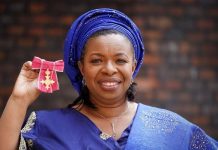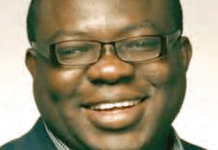 Modern medical advancements have helped save millions of lives, giving many people a chance to live longer and healthier lives. These life-saving advancements would not have been possible without the contributions of humanitarian medical researchers such as Prof. Olufunmilayo Olopade. Her impact in cancer treatment on the African continent has been tremendous and definitely worth exploring.
Modern medical advancements have helped save millions of lives, giving many people a chance to live longer and healthier lives. These life-saving advancements would not have been possible without the contributions of humanitarian medical researchers such as Prof. Olufunmilayo Olopade. Her impact in cancer treatment on the African continent has been tremendous and definitely worth exploring.
Breast cancer is responsible for one of five cancer deaths for women in Sub-Saharan Africa. Although the incidence of cancer is relative low in women of African descent, they are more prone to early and aggressive onset of breast cancer than women from other parts of the world.
This was an observation that perplexed Olopade, then an oncologist at the Cancer Risk Clinic of the University of Chicago in the early 1990s. However, she didn’t realise the profoundness of this anomaly until she visited a cancer clinic in Nigeria in 1997 and saw that all the women there were quite young (in their 20s, 30s and 40s). This prompted her to the reality that breast cancer is common in young Nigerian women – very much like her Chicago clinic; whereas the typical Caucasian woman is usually prone to the disease only after menopause (in their 50s or 60s). Since then Dr Olopade has dedicated her career to unravelling the root causes of this disparity – and thus making ground-breaking discoveries along the way.
Today, Prof. Olufunmilayo Olopade has become an internationally renowned haematology oncologist, geneticist, and expert in cancer risk assessment and individualised treatment for the most aggressive forms of breast cancer. She performed extensive clinical work surrounding the role of the BRCA1 and BRCA2 genes in the incidence of breast cancer in women of African descent. Her study found that that mutations in the two genes—BRCA1 and BRCA2 – occurred in the patients with early-onset breast cancer.
The study also found that breast-cancer tumours in African women develop from basal-like cells, whereas women of European ancestry develop breast tumours from milk-duct cells. The biggest find, however, was the discovery that nearly 80 per cent of African breast tumours do not have oestrogen receptors, compared to 20 per cent Caucasian breast cancer tumours. This meant that hormone therapy, often used to treat breast cancer, would not work in African population.
Tumours that have oestrogen-receptors depend on the female hormone oestrogen to grow, and as such, many doctors treat breast cancer with only oestrogen-blocking drugs, leaving behind tumours which are oestrogen-independent and can only be killed with chemotherapy, with many side effects.
The implication of this findings simply showed that mammogram screenings and conventional first-line treatments used to treat breast cancer in Caucasians might not be the best way to control breast cancer in Africa. Olopade brought awareness to the fact that the real cause of health disparities and treatment outcomes was the occurrence of the most aggressive type of breast cancer among Africans and African Americans.
Olopade and her team from the University of Chicago have successfully described the genetic epidemiology of breast cancer in Nigeria and highlighted cancer risk factors particular to African populations. Olopade and her University of Chicago colleagues have worked with a network of investigators in Southwest Nigeria, including researchers from the University of Ibadan College of Medicine and the Lagos State University Teaching Hospital in collaboration with investigators at the Novartis Institute for Biomedical Research, to uncover the genomic landscape of breast cancer in women of African ancestry using a large-scale sequencing project. Olopade and her team also plan to establish a West African Regional Centre of Research Excellence in Precision Medicine.
In recognition of her efforts and contributions to cancer research, Olopade has received numerous awards and honorary degrees including: Walter L. Palmer Distinguished Service Professor of Medicine Award; honorary degrees from North Central, Dominican, Bowdoin, and Princeton universities. She is a recipient of the Doris Duke Distinguished Clinical Scientist and Exceptional Mentor Award, an American Cancer Society Clinical Research Professorship, and was the recipient of a $500,000 MacArthur Foundation Genius Award in 2005 for her comparative study of breast cancer around the world. The MacArthur grants are given to people who show exceptional promise in making a difference in the world.
In Nigeria Prof. Olopade has been recognised by the federal government with the Officer of the Order of the Niger (OON) award for her extraordinary contributions to the prevention and management of cancer in Nigeria. The American government also appreciated her impact in cancer research, when President Obama appointed her to the National Cancer Advisory Board in March 2011.
Education and career
The fifth of six children, Prof. Olufunmilayo Falusi Olopade was born in 1957 in Nigeria. Her father was a minister of the African Anglican Church. After earning her medical degree in 1980 from the University of Ibadan Nigeria with Distinction in Pathology & Pediatrics, Olopade worked as a medical house officer at the Nigerian Navy Hospital in Lagos during her National Youth Service. She then relocated to the United States in 1983 where she completed her internship in Cook County Hospital, Chicago in 1984.
She went on to do her residence in the same hospital, rising through the ranks and ending up as chief resident in 1986. Olopade left the hospital in 1987 to study Haematology and Oncology as a post-doctoral fellow at the University of Chicago, Pritzker School of Medicine. After her post-doctoral fellowship in 1991, she became a member of the faculty, where she later became a professor of medicine and human genetics. She is currently the Dean for Global Health and director of the centre for Clinical Cancer Genetics at the University of Chicago Medical centre.
Dr Olopade is a member of several professional societies, including the National Academy of Medicine, National Institute of Medicine, American Association for Cancer Research; American Association for the Advancement of Science; American College of Physicians; American Society for Preventative Oncology; American Society of Breast Disease; American Society of Clinical Oncology; American Society of Hematology; Association of American Professors; Nigerian Medical Association; African Organisation for Research and Training in Cancer; American Society for Clinical Investigation and the Association of American Physicians.
Research interest
Prof. Olopade’s research interests are diverse and include: 1) treatment of breast cancer, especially in young or pregnant women, 2) familial cancers; 3) molecular genetics of cancer; 4) cancer risk assessment and chemoprevention; 5) breast cancer and minority populations; and 6) disparities in health outcomes.
Olopade stresses comprehensive risk-reducing strategies and prevention in high-risk populations, having developed novel management strategies based on an understanding of the altered genes in individual patients as well as earlier detection through advanced imaging technologies.
The erudite doctor is married to Dr Christopher Sola Olopade, whose specialty is treating asthma and sleep disorders. They met in medical school at the University of Ibadan. Currently, they live in Chicago, USA with their two daughters and son.











NB: This is a modified version from my previous post.
So thankful to God for the write-up on Prof Olufunmilayo Olopade, the US, Chicago based Nigerian Haematology Oncologist.
So proud to read about the strides and achievements of this brilliant breast cancer scholar of African descent.
Incidentally, I am a breast Cancer Survivor. So Prof Olopade’s dossier meant a lot to me for reference and possible contact/ follow up
Grateful to the writer for the information shared.
Well done
Thank You
So thankful to God for the writeup on Prof Olufunmilayo Olopade, the US, Chicago based Nigerian Haematology Oncologist.
So proud to read about the strides and achievements of this brilliant breast cancer scholar of African descent.
Grateful to the writer for the phenomenal dissemination of information shared .
Interestingly, I am a breast cancer Survivor. So Prof Olopade’s docile meant a lot to me for a reference and possible contact/ follow up
Well done
Thank You
kindly let me have a private discussion with you ma. I will really appreciate this.
Thank you.